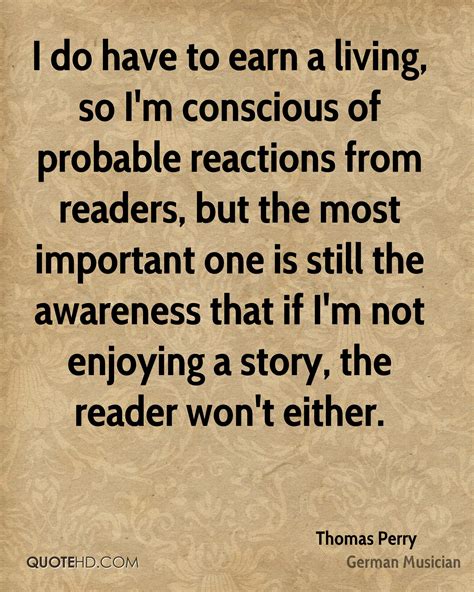A Quote by Thomas Perry
Reading a novel in which all characters illustrate patience, hard work, chastity, and delayed gratification could be a pretty dull experience.
Related Quotes
A novel is not an allegory.... It is the sensual experience of another world. If you don't enter that world, hold your breath with the characters and become involved in their destiny, you won't be able to empathize, and empathy is at the heart of the novel. This is how you read a novel: you inhale the experience. So start breathing.
In reading a novel, any novel, we have to know perfectly well that the whole thing is nonsense, and then, while reading, believe every word of it. Finally, when we're done with it, we may find - if it's a good novel - that we're a bit different from what we were before we read it, that we have changed a little... But it's very hard to say just what we learned, how we were changed.
To become grateful, I must learn that I can handle disappointment and delayed gratification with grace and perseverance. This is why practices such as fasting and simplicity are such powerful tools for transformation. The experience of frustration and disappointment is irreplaceable in the development of a grateful heart.
But to be perfectly frank, this childish idea that the author of a novel has some special insight into the characters in the novel ... it's ridiculous. That novel was composed of scratches on a page, dear. The characters inhabiting it have no life outside of those scratches. What happened to them? They all ceased to exist the moment the novel ended.
I like a novel to have a certain amount of dead time and filler - unremarkable scenery, descriptions of getting from point A to point B, dialogue in which not much is said - in between the parts that are electric. With a long work that you don't read in one sitting, I think that makes for the best reading experience.
With a novel, which takes perhaps years to write, the author is not the same man he was at the end of the book as he was at the beginning. It is not only that his characters have developed-he has developed with them, and this nearly always gives a sense of roughness to the work: a novel can seldom have the sense of perfection which you find in Chekhov's story, The Lady with the Dog.




































